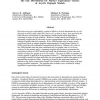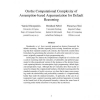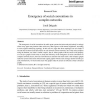138
Voted
AI
2002
Springer
15 years 2 months ago
2002
Springer
Bayesian networks, equivalently graphical Markov models determined by acyclic digraphs or ADGs (also called directed acyclic graphs or dags), have proved to be both effective and ...
AI
2002
Springer
15 years 2 months ago
2002
Springer
146
Voted
AI
2002
Springer
15 years 2 months ago
2002
Springer
Automated negotiation is a key form of interaction in systems that are composed of multiple autonomous agents. The aim of such interactions is to reach agreements through an itera...
113
click to vote
AI
2002
Springer
15 years 2 months ago
2002
Springer
Systems provide a rich abstraction within which divers concepts of reasoning, acceptability and defeasibility of arguments, etc., may be studied using a unified framework. Two imp...
117
click to vote
AI
2002
Springer
15 years 2 months ago
2002
Springer
We present different constructions for non-prioritized belief revision, that is, belief changes in which the input sentences are not always accepted. First, we present the concept...
118
click to vote
AI
2002
Springer
15 years 2 months ago
2002
Springer
ko et al. have recently proposed an abstract framework for default reasoning. Besides capturing most existing formalisms and proving that their standard semantics all coincide, th...
102
click to vote
AI
2002
Springer
15 years 2 months ago
2002
Springer
The emergence of social conventions in multi-agent systems has been analyzed mainly in settings where every agent may interact either with every other agent or with nearest neighb...
123
Voted
AI
2002
Springer
15 years 2 months ago
2002
Springer
This paper provides algorithms that use an information-theoretic analysis to learn Bayesian network structures from data. Based on our three-phase learning framework, we develop e...
128
Voted
AI
2002
Springer
15 years 2 months ago
2002
Springer
This article surveys three techniques for enhancing heuristic game-tree search pioneered in the author's Othello program Logistello, which dominated the computer Othello scen...
156
click to vote
AI
2002
Springer
15 years 2 months ago
2002
Springer
Learning to act in a multiagent environment is a difficult problem since the normal definition of an optimal policy no longer applies. The optimal policy at any moment depends on ...



